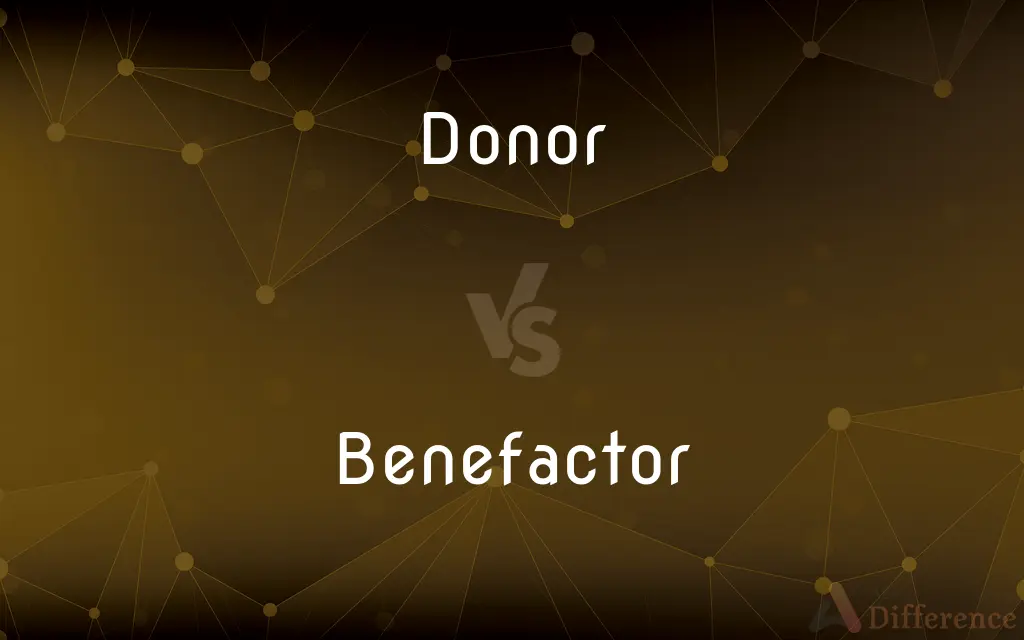Donor vs. Benefactor — What's the Difference?
Edited by Tayyaba Rehman — By Urooj Arif — Updated on April 25, 2024
A donor gives something, typically money or goods, often to a cause or charity, while a benefactor provides more substantial support, usually financial, that often impacts the larger scope or mission of an organization.

Difference Between Donor and Benefactor
Table of Contents
ADVERTISEMENT
Key Differences
A donor contributes items, money, or services, usually as part of charitable giving or support for specific causes, whereas a benefactor plays a role that includes significant financial contributions that can influence the direction or sustainability of an organization.
Donors often participate in one-time or multiple contributions without a requirement for deep engagement, while benefactors are usually deeply involved, potentially influencing decisions or the future of the entities they support.
While anyone can be a donor with even small amounts of money or goods, a benefactor typically denotes someone who has given large sums or crucial support, setting them apart in terms of impact and recognition.
Donors are essential for the operational support of many organizations, providing necessary funds or resources on a broad scale, on the other hand, benefactors often contribute in a way that can lead to long-term sustainability or growth.
The term 'donor' is widely used across various contexts, from medical donations to philanthropy, whereas 'benefactor' carries a more historical and substantial connotation, often associated with significant personal or financial investment.
ADVERTISEMENT
Comparison Chart
Definition
Gives money, goods, or services
Provides substantial support
Typical Contributions
Any amount or form of donation
Large, impactful financial aid
Engagement
Typically limited
Often deeply involved
Influence on Recipient
Supports specific needs
May shape direction or goals
Common Contexts
Charity, medical, educational
Philanthropic, educational, arts
Compare with Definitions
Donor
An individual providing goods or services for free.
He was a frequent blood donor.
Benefactor
A major financial contributor to an institution.
Thanks to a benefactor, the library was completely renovated.
Donor
One who gives something voluntarily.
The donor contributed art supplies to the local school.
Benefactor
One who provides help, especially financial.
The benefactor supported several scholarships.
Donor
A contributor to a specific fund or cause.
As a donor, she felt satisfied seeing the community benefits.
Benefactor
Someone whose support is vital for sustainability.
The university acknowledged its benefactors at the gala.
Donor
Someone who grants or gifts something.
The museum displayed a plaque naming its major donors.
Benefactor
A person who gives monetary or other aid.
The benefactor's grant founded the new research center.
Donor
A person who donates money to a cause.
Donors to the campaign received thank you letters.
Benefactor
A person providing critical support or resources.
As a benefactor, his focus was on long-term development.
Donor
A donor in general is a person, organization or government which donates something voluntarily. The term is usually used to represent a form of pure altruism, but is sometimes used when the payment for a service is recognized by all parties as representing less than the value of the donation and that the motivation is altruistic.
Benefactor
One that gives aid, especially financial aid.
Donor
A person who donates something, especially money to charity
An anonymous donor has given £25
Loans from rich donor countries
Benefactor
Somebody who gives a gift, often money to a charity.
Donor
One that contributes something, such as money, to a cause or fund.
Benefactor
Someone who performs good or noble deeds.
Donor
(Medicine) An individual from whom blood, tissue, or an organ is taken for transfusion, implantation, or transplant.
Benefactor
One who confers a benefit or benefits.
Donor
(Chemistry) An atom, molecule, or ion that provides a part to combine with an acceptor, especially an atom that provides two electrons to form a bond with another atom.
Benefactor
A person who helps people or institutions (especially with financial help)
Donor
(Electronics) An element introduced into a semiconductor with a negative valence greater than that of the pure semiconductor.
Donor
(Medicine) Used for transfusion, implantation, or transplant
A donor organ.
Donor
One who makes a donation.
The charity raised $2,000 from various donors.
The hospital is seeking an organ donor.
Donor
(chemistry) A group or molecule that donates either a radical, electrons or a moiety in a chemical reaction. Compare acceptor.
A carbonyl donor molecule
Donor
One who gives or bestows; one who confers anything gratuitously; a benefactor. Inverse of recipient.
Donor
One who grants an estate; in later use, one who confers a power; - the opposite of donee.
Touching, the parties unto deeds and charters, we are to consider as well the donors and granters as the donees or grantees.
Donor
Person who makes a gift of property
Donor
(medicine) someone who gives blood or tissue or an organ to be used in another person (the host)
Common Curiosities
What distinguishes a donor from a benefactor?
A donor typically provides contributions, while a benefactor gives substantial, often strategic support.
Can a donor become a benefactor?
Yes, a donor can become a benefactor by increasing their level of support and engagement.
What motivates a benefactor to give?
Motivations can include personal fulfillment, desire to effect change, legacy building, and tax benefits.
How do organizations recognize benefactors?
Through naming rights, public acknowledgements, and invitations to serve on governing boards.
Why might someone choose to be a donor rather than a benefactor?
Due to financial limitations, preference for anonymity, or interest in supporting multiple causes with smaller amounts.
How important are donors to non-profit organizations?
Extremely important; they provide the broad base of support necessary for daily operations and special projects.
What types of projects do benefactors typically fund?
Large-scale initiatives, capital projects, endowments, and significant programmatic work.
Is the impact of a benefactor generally larger than that of a donor?
Yes, benefactors often have a larger impact by contributing significant resources that affect the core mission of organizations.
What legal benefits do donors and benefactors receive?
Tax deductions and other incentives that vary by country and the size of the contribution.
Can businesses be benefactors?
Yes, businesses can act as benefactors, particularly in corporate philanthropy, where substantial support is given to initiatives aligning with their values.
Share Your Discovery

Previous Comparison
Standardise vs. Standardize
Next Comparison
Gala vs. SoireeAuthor Spotlight
Written by
Urooj ArifUrooj is a skilled content writer at Ask Difference, known for her exceptional ability to simplify complex topics into engaging and informative content. With a passion for research and a flair for clear, concise writing, she consistently delivers articles that resonate with our diverse audience.
Edited by
Tayyaba RehmanTayyaba Rehman is a distinguished writer, currently serving as a primary contributor to askdifference.com. As a researcher in semantics and etymology, Tayyaba's passion for the complexity of languages and their distinctions has found a perfect home on the platform. Tayyaba delves into the intricacies of language, distinguishing between commonly confused words and phrases, thereby providing clarity for readers worldwide.
















































